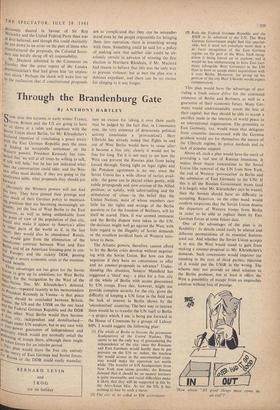hel
OUTSIDE those authoritarian countries l'''''4 a staged 99 per cent. 'Yes' vote ,d sometimes regarded as useful for publicity i/w poses, there can rarely have been so pelPal: bogus an election as the one held this wee, if ,• Southern Rhodesia. Ostensibly it was designed it %, a referendum to decide the constitutional futtio of the territory—and in particular. whetheei, I should remain within the Central African Fecictty f. tion; but as only 4,000 of the country's 2,50th4 i Africans were allowed to vote, the pretence tot I the results would be valid was a mockerY.1 As if that were not bad enough, the elt:cti was held just after' the discovery in Noeleuye ri Rhodesia of a mistake in the regulations of new Northern Rhodesian constitutional Pi posals. Analysis by a Lusaka matheniatio revealed that the proposed system is even fil nm sa to decisively slanted in favour of Sir Roy VVelensky and the United Federal Party than was at first believed; and though this could charitably be put down to an error on the part of those who manufactured the proposals, the Colonial Secre- tary can hardly shrug off all responsibility.
Mr. Macleod admitted in the Commons on uesday that the press report of the Lusaka athematician's find had given him 'an unplea- nt shock.' Perhaps the shock will 'wake him up the realisation that if constitutional proposals are so complicated that they can be misunder- stood even by the people responsible for bringing them into operation, there is something wrong with them. Something could be said for a policy of making sure that neither side could be ab- solutely certain in advance of winning the first election in Northern Rhodesia, if Mr. Macleod had reason to believe that this was the only way to prevent violence; but at best the plan was a dubious expedient, and there can be no excuse for clinging to it any longer.



































 Previous page
Previous page